- Home
- C. Sean McGee
Happy People Live Here Page 3
Happy People Live Here Read online
Page 3
9B
The Father couldn’t hear a word The Porter was saying. Even if the wind were descanting at just a mere whisper, still, with his tempestuous thoughts, he wouldn’t be able to hear a syllable of what the hefty man, leaning precariously out of the open window, had been shouting out to him in what looked like forced and nervous banter, as if his clapping mouth were vellicating the fibers of an itching nerve, long in his ear canal, near the back of his throat.
The Porter was nodding fast as he spoke. So fast was it that he hardly looked like a learned man in concurrence with his own thoughts. It looked as if he was in the throes of a violent fit and rabid speech was just one of his instinctual lashes.
The Father gripped the wheel, tapping his fingers impatiently with the rhythm of some song now running deafeningly through his mind. As the cold wind and rain spat through the gap in his window, The Father nodded back and smiled, as one does, in their own nervous fit, one of polite and congealing displeasure.
A car waiting on the street honked once and then twice and then once or twice more. And the sound, it played as a distinct harmony to the chorus that was descanting in The Father’s mind.
“That’s great, but we really have to go,” he said, hinting with his open palm at the lashing rain that was stinging his listening ear.
“How’s your daughter” shouted The Porter.
And this time, the word daughter cut through the howling wind and sounded just as clear as it did in his mind.
“It’s a hell of a thing you know,” said The Porter. “What happened, real sad like, you know? I was just telling my wife that…”
The Father put the car in gear and drove past the gate and around the car that had been inching forwards for the last minute or two. He looked to his right, as he always did, to shout his grievance with a weighty stare, and he saw his neighbor, Elaine or Lisa or something, something plain that started with an ‘L’, it didn’t matter. He saw her in the crawling car, waving manically and dipping her head as if someone were about to bestow her with a sash or something.
Crazy bitch.
“I think we should move,” he said.
The Mother said nothing.
The evening rain beat down heavily on the roof of the car as it wove in and out of slow moving traffic, seemingly on its own dreamlike accord. The Father sat, barely touching the turning wheel, mesmerized, as the glowing reds of the brake lights before him, splashed across his windscreen like bloodied clouds, weeping from a wound in the sky above.
The Mother sat in the back, behind the driver seat and tucked behind the headrest that was high enough so she wouldn’t have to see the back of his head or assume that he was even there. It wasn’t something she had always done. This wasn’t a behavior or a trait. It was just something that as of late, had felt like the right thing to do. It felt like the right place to be.
It was easy to dream in weather like this. The falling sky seemed to invite one into abstraction, following the lines of the road as they sank beneath the swishing and swashing of flooding waters that swept up from the passing of speeding trucks.
The Father focused on the sound of every drop as each one crashed upon the car and broke apart into a hundred thousand more, and with it, so too the face of a child of which haunted his thoughts.
“Can you put something on?” The Mother asked.
Her voice was dull and rumbling, much like the weak and distant thunder, rolling about between blankets of swirling grey cloud, somewhere in the direction of where they were heading.
“There’s nothing,” said The Father.
“Yes, there is. There’s always something” said the Mother. “The cd, play the cd. I like that. We like that.”
The Father flicked a button and the blue lights of the radio glowed as the sound of a rattling drum, starting at first as a tiny teeter tatter before quickly building into a raucous chorus of horns and whistles and dinging bells.
The Mother smiled. She closed her eyes and sank into her seat with her hands, tucked between her skittish knees.
“I might just wait in the car while you... you know. You do your thing” he said.
“No,” she said, shaking her head as if she were shaking water from her ears. “That’s just great. So what am I supposed to do? Just sit there by myself? This is supposed to be for the both of us. It’s part of the healing.”
The sound of children clapping bridged their malcontent verse.
The Mother smiled once more.
Her sunken stature sank a little more.
And her hands, tucked between her skittish knees, grasped the small colored butterfly while her long curling nail, picked gently at the line of thread that was still drawn around the small button nose.
The Father, listening to the children’s harmony, couldn’t escape thought of Korine, she, standing in front of the door of the clinic with a small umbrella in her hand, barely managing to keep it upright as a howling wind and lashing rain hurtled past her face, pulling apart her every particle and atom as if she were made of sand, until, at the end of the momentary gust, there was nothing but a small pink umbrella, rolling back and forth on a sun-drenched porch.
“I’m not feeling alright,” said The Father.
He touched his hand to his stomach, feigning a symptom of which he wished might be fooled enough into becoming real.
“I told you, you need to eat something instead of just drinking coffee all day long. It’ll rot your stomach it will. It’s probably doing it now. That’s probably exactly why you’re stomach’s upset. Eating right is part of it, you know?”
“Part of what?”
“The healing,” she said. “The food we put into our body and the food we put into our soul. It’s not just about affirmations. I mean, that’s kind of key and fundamental, but you can’t expect to, you know, drive that home, if you’re running on empty or worse… just caffeine. You’re doing the opposite. You’re doing it all wrong.”
“Am I?” he said, wishing his foot was not on the brake but instead, driving the car into the back of whatever stationary object was strong enough to grind him into dust.
“I was thinking, maybe, I might go to Argentina. Remember? I was telling you before, about the retreat there and it’s the best apparently” said The Mother.
“What, now? We don’t have the money.”
“We can figure something out. It’s only money. You can just pick up some more work.”
“Are you fucking deaf? We don’t have the money. Do you really think fucking off to Argentina is gonna to fix things? Really? And what about Korine?”
“What about her?”
“What about me?”
“Alright. Not now, god! Just, you know; I was thinking; I deserve this; I deserve Argentina.”
“You deserve it? You think any of this is about who deserves what? Fuck Argentina” shouted The Father.”
“God, relax.”
Stupefied, The Father slammed on the brakes and the car skidded on the wet road to an abrupt halt. Behind them, white lights flashed once and then twice and then a hundred times over as the traffic behind them skidded, almost to the point of disaster, to a complete stop.
“What are you doing?” shouted The Mother.
She looked over her shoulder.
High beams were flashing.
And in the distance, she could swear that sirens were sounding.
Horns were being laid upon with beating fists as, inside her thoughts and her educated and mannerly mind, she sank further and further into the invisible, embarrassed by all the kafuffle.
The Father smiled.
All of the shouting and the cursing and the beeping horns and the flickering high beams, they seemed to quieten the howling inside of his mind; the howling that came from the thoughts that he kept buried beneath a clear head.
“Babe, what are you doing?” shouted The Mother, in a contained tone.
In the play of light and sound that staged upon his rear view mirror, The Father could see the outline of a man
coming from somewhere in the blur behind them, walking with stern approach. The Man’s arms swung like a judge’s hammer, his fists clenched and walking with such vigor that it was obvious that there would be no polite council in his intention.
“Babe, go,” said The Mother. “Go” she pleaded. “Please, just drive.”
The Father’s smile widened.
The Man in the rain brushed against The Mother’s door, his clenched fist almost breaking the tinted glass.
“Hey” The Man screamed, beating his fist against the driver’s window.
The Father smiled.
He felt a great pressure in his stomach and in the back of his head, but he smiled, imagining that soon that pressure might be beaten out of him and then he wouldn’t have to feel this way anymore.
“Hey, asshole” shouted The Man, banging his fist once more.
The Father turned the ignition and lowered the window just as The Man swung his fist and the clenched hand wrapped hard against the side of his face. There was blood almost immediately; a lot of blood. It was as if The Man had pulled a plug from The Father’s nose.
And the blood, it ran so freely.
“Oh Christ,” said The Man.
He stepped back from the car and held his open palms upwards in defensive banter.
The Father undid his belt.
The click sent The Mother in a furor.
“Don’t you fucking go out there. Stay in the car, please. Don’t fight him” she shouted.
Like an apology from a child’s tongue, her words had little effect on how he felt; a feeling that he could not explain. Much like The Mother, cradled in the back seat, it was a feeling that felt right and these were the kind of feelings that didn’t need explanation. They were the kind of feelings that could never be properly explained in the first place. The kind other people never understood.
The zipping of the seatbelt, as it drew back across his chest and his turning shoulders, had The Mother reaching forwards with her hands to contain him, to pull him back and to keep his tied to his seat until time had aged enough for this moment to eventually pass, much like the thunderous clouds above their head. She couldn’t reach him, though. Her leisurely slouch had her clasping at nothing more than the air between her frightened glare and the headrest before them.
“Babe, no, get in!” she shouted.
The Father was already out.
He was on his feet.
And the rain, it was pelting down.
It washed the blood from his nose.
But it didn’t dissolve him, not like he had hoped.
“Get back into your car buddy. I’m warning ya” shouted The Man.
He was throwing about his words as if they were clenched fists, partly hoping they alone would suffice. The Father, though, he stood completely still, like a pillar or a mound of dirt, inanimate and almost solaced by his wounded nose, the lashing rain and the imminent threat before him. He wore neither a smile, nor a grimace, nor a penitent frown. He looked, with irenic wonder, at The Man with the strong words in the pouring rain whose angered voice trembled, but only slightly less than the feverish shake in his now clenching fists.
The Father didn’t respond. He stood completely still and unwavering as he stared at The Man, who was taking a further step back with every shake of his waspish fists, they, still held high in a fighter’s stance, but the stance of a fighter who was counting out the seconds of the final round and in silent prayer for the ringing of a bell or the throwing in of a towel, from behind the flashing of high beams, or from the backseat of The Father’s car.
“Babe, get in the car, please.”
She was more than pleading now. Her tears came down heavier than the rain above.
“You’re fucking mad. You’re a loony” shouted The Man with the strong words.
The Man turned and walked back along the line of traffic and he quickly became invisible; just a faceless smudge amidst an impalpable blur on the soaking canvas of falling rain and flashing lights.
“We don’t have any money,” The Father said. “Nothing. Not a cent. I lost all my clients. There’s nothing now. Nothing” he said.
“Get in the car” The Mother screamed.
The Father turned, not because The Mother pleaded, but because he did. There wasn’t any reason for it, not one that he could explain anyway. If it was to do with her, he might have just stayed under the rain all night long, just to rouse her supposed affection. But he did move, more so in coincidence with her request. He moved for no other reason than because it felt right, just as it did, getting out in the first place.
“Don’t tell me to relax?” he said, turning the ignition and accelerating slowly. “I fucking hate that.”
His nose ached. It felt as if someone had wedged the leg of a chair up his right nostril, sideways. The flow of blood down his face made his face feel full, like when he used to have a beard. He had only had one for a short time before he had to get rid of it. It wasn’t so much his wife’s grievance, it was Korine. She didn’t like it.
It was too prickly.
It made her feel yucky.
And it was gross when she hugged him.
So he shaved it off.
He liked the feeling, though, of having a beard. He felt less exposed. Other people looked at him differently and the ones that didn’t know him, they talked to him different as well. They asked him different things. And they asked in a different way.
The Father liked that.
And the blood, now gushing from his apparently broken nose, it spilled over his lips and onto his chin and it ran down his neck and dripped onto the seat in the space between his legs. His hair was matted and cold from the rain but his face and his neck, they felt warm and covered.
Less exposed.
“Oh,” The Mother said, in strange joviality, “there’s parking out front.”
The Mother walked in first, covering her hair from the falling rain with a folded comic she found in the backseat. The Father followed. He stood, though, in the rain, watching the cars, as they zoomed past him on the street.
He looked back inside through the doors, their heavy hinges slowly shutting him out. Inside the room, The Mother was parading herself from person to person and taking from each one, a moment in their seemingly tender embrace.
This wasn’t the first meeting they had been to. It was no strange encounter. Not one from which The Father might have been truantly absconding. This might have been the third or the fourth or maybe the thirty first. The Father wasn’t sure. It all felt kind of the same.
The meetings and the people that he saw there, and the chairs too, and how they were arranged to look like sundrenched petals, they always looked kind of the same. And the names of children, those who had died tragically in accident or injury or disease or at birth, they were written in the sand and pictured, way up above as if god were the lens and they too, they looked kind of the same.
And the grief, oh the grief! It, and unto it, the absurd amount of lavish attention, it was always in such abundance, more so, than the vat of coffee, that which sat tepid and carious in the back of the room. And the warm shower of grief and the weak tepid coffee. They too, were always, kind of the same.
The faces.
The mourning.
The longing stares.
The teary eyes.
The suffocating embraces.
The choking words that spluttered like an engine starved of air, from their arid crackling voices.
The understanding.
The sympathy.
And the weak tepid coffee.
They all kind of felt the same.
Everything, not just the meetings and the healing and that coffee, but everything. Everything seemed to feel this way.
There was a particular pattern to every day that The Father seemed to be unfolding and looking into even further with each passing of the sun into the setting of his thoughts. And as he tried to look further into his thoughts, into his feelings and into the th
ings around him that were supposed to matter, he found more often, that everything was kind of the same.
Once, years ago, The Father had gone a course of antibiotics. He had suffered from a depression. And one day, something triggered in him. A disliking thought. A stupid suggestion. It was something. What it was exactly is not important for you to know. It won’t change what you think of him.
It was just a trigger.
And a trigger is never quite as interesting as what it projects.
So that day, something did happen. And The Father, he went head strong into a warm and abasing depression. Now, it wasn’t the depth of his mind that had him fall ill, but in fact, where his mind had been kept; that being in the farthest most congested corner of the top floor of a clittered and clattered and cluttered, stuffy and stifling studio.
Sitting there that day, as his deeply depressing lungs sagged and soured in a sink of sticky, humid air, an evil had born itself in his lungs and by the end of that day, he was laid upon a hospital stretcher, unable to breathe and covering, with his right hand, the scratches and scars on his left shoulder, those which he could not explain and hoped would not have the young child beside him, thinking he were strange or worse yet, dangerous.
Aside from the depression and pneumonia, and the way he felt as the impressionable boy beside him thought of things he could say and ask while staring at the scratches on The Father’s arms, thinking of them with fewer objections than The Father did himself, aside from that, was the treatment.
It was a course of antibiotics; little white pills; and he took them. He took them as prescribed. He took them without debate. He took them, hungered to be lesser than the ill that he was. He took them, wanting to be healed. He took them all. Not a pill more and not a pill less. Not a second outside of when they were supposed to be taken.
And with his treatment came an illness on his tongue, one in which everything that passed his lips – everything, from the air that he breathed to the lightly peppered cheese that he ate – they all tasted the same. They tasted as if the food had been dusted with cigarette ash and gently kneaded and massaged inside cancerous lungs. Everything had that same sickly flavor.
He couldn’t smoke.
He couldn’t eat.
He couldn’t drink.
And he wished that it was that he could not breathe.
Everything tasted the same.
And that was healing.
It was what healing tasted like.
It was healing’s aroma.
It was the dry retch that healing left, desiccating in his mouth.
It was what healing made everything become.
Fetid and polluted.
Common and mundane.
Just as it was now.
The healing and the therapy and the people and the coffee.
Weak and tepid.
But different today was the trickle of blood that ran from a cut in his nose, over his swollen lips, down into the groove on his chin – from an accident he had had as a young boy wanting to be faster than he was skilled at being – and in a thin, almost artfully brushed line, down the center of his shirt.
There wasn’t a lot of blood but to a common person, it might seem that there was, in fact, a great deal. It was in no way gushing. It was just a clear stream of red from the round in his right nostril, down onto his chest where it had slowed and dried, ending just above his belly button. It was the preciseness, and the fact that still, after having been some twenty minutes from the altercation, from having been punched in the nose, he hadn’t wiped his hand across his face. Not even a scratch at his pulsing nose. Not even a broad wipe of the sweat from his brow, that which paused below his eye like a modest tear, before catching the current of his sunken cheek into the deluge of his swollen lip and the river of red that surged from it.
And so, as the black and fetid street rain splashed up the backs of his legs from passing cars, The Father watched through the steamed and blurry glass doors. He watched as The Mother moved from person to person and drank upon their sympathy like a drunkard would, the warm dregs from scores of squashed and discarded cans.
“She’s so good at that,” he said.
A passer-by turned to his attention.
“So good at what?” The Passer-by thought as she passed him on by.
The Father didn’t notice.
The Mother made them come at this hour, at this late hour. Either on purpose or not, she did. And he knew it was because of this affection, the way they devoured her grief like hundreds of thousands of white wriggling maggots, swarming upon a mound of warm feces.
She made them come late; conscious of it or not.
If she were first in the car, with her impatience sounding out the honking horn, they would arrive late. Even if she had taken to driving herself, obviously knowing the better way, they’d end up behind a slow moving truck and an argument would break out over why she wouldn’t overtake. But really, it would be about ‘what else, he wasn’t telling her’.
That would upset him. Then there would be a passing comment, some snide remark while he stared out the passenger window, watching the exit they should have taken, passing into his side mirrors. Then something would be said in a mutter and it would be followed by shouting and cursing and hurtful truths and from that, there would be heavy traffic or a flat tire or a wrongly taken short cut or there’d be a fight with some guy in thunderstorm and it would have nothing to do with what that guy had said or done, it would just feel like the right thing to do when all other options had failed; when shouting and cursing and hurling abuse didn’t make either of them understand any better, what the other one had wanted all along.
Something, other than her wanting to be there would always make them late. And she would walk through those doors, and she would be shushed of her apology and in the first spate of kindness, she would let go of her watery cannons, and upon the first sprinkle, the petals would all part as men and women and their brought along children, they would all rise to their feet and cradle The Mother and then give her all of their blessing. They would give her all of their forgiveness. They would give her all of their everything.
And as the last one in, as the center of their attention, she would have to give nothing away, of that, which she was given.
“Please, make no excuses, not amongst friends,” The Leader said, gently caressing with her middle finger, the arch below The Mother’s shoulder blades, at the point where they instinctively curved whenever she felt inexperienced or aroused.
From around the sacred circle came a flood of salted eyes, all swept up by the sediment of The Mother’s drab current, it, far more suppressing and convincing than the smile she wore like an ill-fitting blouse.
The people and their nursing faces, some of them new but most of them, now seeming safe and familiar, they all washed upon her isle of depression and clung to her wrought iron expression like dogged barnacles.
The Mother felt a shiver run through, inside and around her. She wasn’t sure where it started. It didn’t seem to matter whether it was at the tips of her toes, at the arch of her feet or in the folds of skin that tucked inside the round of her knees or whether it was by the dip in her waist or neath the curve in her breast or at the palm of her hand, just below the scar that itched, ever since she was a girl. It might have started in the back of her mind or it might have started on the back of her hand. It might even have been from the curling finger, lightly caressing the arch below her shoulder blades. Anything could have started this shiver and if she knew, if she had found the source, she would ask and she would beg and she’d pray and she’d plead and she’d do whatever they asked, to kindly feel that way again.
The Mother hadn’t felt this way, not since she was eight when she fell off her bicycle and badly grazed her knee. Back then, when she was little, the people she depended on - the people that loved her – they never thought twice about smothering a young girl, so obviously hurt and distraught, in every inch of their affection; where in t
he coldness of her mounting fear, they would hesitate not, in warming her, in the blanket of their hearts.
She missed that.
She hadn’t felt that, not since that day. She didn’t feel it when she was eleven, and she came home from school every day in tears and her mother said that everything would be ok, even though both of them knew that it wouldn’t and even though, when the tears dried and her sobbing stopped, even though it might have looked like she wasn’t actually hurt, beneath all of that, beneath her feigned calm, she was.
She was hurt. And she was scared. And when her mum dried her tears that day, when she was eleven, when she rubbed her back and scrunched her head and when she held her tight and said, whilst flicking through the pages of a magazine, “It’ll all be ok, don’t you worry now,” she didn’t feel the way she felt when she was eight with her badly grazed knee.
And that day, years later, when she rushed home from school and there was nobody there. When she knew there was something wrong. When she thought she was going to die. When there was all that blood down there. She had never felt that scared before and hardly since.
And that day, when she locked herself in the bathroom, crying at the dreaded thought of having to go back to school, and when her mother shouted through the bathroom door that “There’s nothing to worry about, you’re just becoming a woman,” she had never felt as confused. And still to this day, she wondered every now and then, “How much must I bleed before I finally become a woman?”
And that book that her mother snuck in her panty drawer, the one that was scribed by thick knuckled nurses and was more like a handbook for changing motor oil than it was, delicate and necessitous to how she felt at that moment. That book, her mother’s words and how she was just supposed to gingerly pass through such a metamorphosis, it too bared no comparison to what she had felt when she was eight and she grazed her knee.
She didn’t feel the way she felt now, at the mercy of a stranger’s kindness.
She didn’t feel that way.
She hadn’t felt that way.
Not in such a long time.
Not since she grazed her knee.
And now.
Now that she had fallen.
Now that she had grazed her soul.
And now that she was so apparently hurt.
Bandaged in a brightly colored blouse and tidy smile.
Now, she felt that way once more.
Their embrace could have gone on forever. And she would have had it that way too, had she half a chance. It could have been all that they had to discuss and if it were, it would have been all that she would ever have wanted to hear. If she needn’t speak for herself to be so heard, for a stranger to see through her every layer and for them to hear the pitch of her unsung verse, if she needn’t say a word, not one syllable, then let her conduct their choir, let them sing of her muted note.
“I don’t know what to say,” The Mother said, holding scores of warm curling hands whilst turning to paint her appreciation in each of their attentive eyes.
The Leader brushed her palm over her back.
“Your eyes speak of what your tongue has learned, of not what to do,” The Leader said.
The Mother gazed into the glimmer of her eyes.
She looked as if she could weather any storm.
“It’s natural,” said The Leader, “for us to feel this great frustration like there is something wrong with us for the way we feel.”
Everyone nodded.
“The way we feel…” The Leader said in dramatic pause, her hands held over her heart as she lowered her chin to her chest and inhaled. “How are we supposed to know how we feel? How do you feel?” she said, posturing to a timid woman, shaking as her hands clung like her leaders, to her clammy chest.
“I feel…..”
“Of course you’re without word,” said The Leader, pulling the woman in close to her chest like any wounded dove would wish that their mother had done. “You were told, since birth, you were learned, to say the opposite of what you felt. It was wrong, it was uncultured, it was rude, it was whatever it was, but it was never taught to you as being right to just say what you feel. You never learned those words. We” she shouted. “We never learned those words. When you’re frightened, when you feel scared, when you feel inappropriate, when you feel incapable, when you feel beset upon and insufficient in your own escape when you feel this way; like a woman besieged, how the hell are you supposed to put that into word? Not when our learning is founded on man’s metaphoric assumption of what the hell is going on. Speaking in bloody euphemisms so as not to disgust or unsettle anyone with your emotional discord. You couldn’t possibly explain what’s going on. You learned as a girl that whatever is wrong, when someone asks you, ‘what’s wrong?’ What do you say?”
“Nothing,” said one woman.
“Nothing” shouted everyone else.
“That’s right. You say ‘Nothing’. And then someone offers you a sandwich and you say ‘no thank you’ and some boy pinches your bum and you turn and say ‘I’m sorry’ like somehow you’re to blame like you made him do that and now he feels bad and somehow that’s your fault. And then someone gives you something you that didn’t ask for and that you didn’t even want nor need it and they make you say ‘thank you’ even though you don’t feel an inch grateful. You feel something else entirely and you can’t say how you feel cause you don’t know what that is. So when someone asks you now, ‘how do you feel”, what do you say?”
All of them, the women and the men and the children, they all looked at The Mother. And The Leader too, she was looking in her direction and she was holding her arms out, to welcome her to her loving bosom.
“How do you feel?” asked The Leader again.
The Mother’s face tightened.
“Don’t think?” said The Leader. “Just say what you feel.”
Her hand continued once again, to caress the arch below The Mother’s shoulder blades.
“How do you feel?” she asked once more.
“Lonely,” said The Mother.
The Mother lifted her solemn glare and through the splatter of droplets that blurred the outside world through the glass doors, she could just barely see The Father, looking right back at her. She didn’t smile and she didn’t nod and she didn’t hint at all for him to do anything other than what he was already doing. She stared at him, just as a pigeon might, at ‘Saturn devouring his son’ or its shadow, cast upon what it could not see.
It was as if The Father were a word that she had not learned, one of which she could not spell, one of which she had no will to pronounce.
He was like a conspicuous clause in a contract, written in fine print and easily overlooked. And like a lapse in her sight, he was hardly distinguishable from the watery smudges that blurred the glass doors where he stood, gazing back at her.
He was hardly the man she had imagined him once being.
As she stared from her seat, smiling genuinely at the warm expressions setting about her, she lowered her hands between her legs once more, hidden beneath the seat where she sat. And as if she were scratching some itch that shamed her to have and worsened her to attend to, she picked ever so gently at the fine thread of the small button nose with her long colored nail.
“You don’t have to speak if you don’t want to. Not with your words, if you cannot muster the strength just yet. We understand. We all do. We have all been where you are now. I’m not saying your pain isn’t unique. That it’s not important. All of our pain is. It is ours to bear. It is ours to carry through every morning. While the rest of the world continues with their mundane and normal lives, our pain, our unique pain, it’s what we carry and learn to tuck away, somewhere out of sight so as not to make anyone feel uncomfortable or worse yet, somewhere close to as sad as how we feel. But we have to carry on. And we have to do so, carrying our enormous debt. This weight that we cannot shed. We cannot because we can’t. People ask us what’s wrong. But they have no intention of listening or f
eeling an inch of the hurt that we feel. The same hurt we all feel in our own unique way. We are all here to listen. In this group, we are survivors. We mourn every second of every day until we finally pass out on our beds from a cocktail or remorse and blame and a hundred thousand ways that we could have done things differently. And then we hurt again, in our dreams. You don’t have to speak. Not with your words. We’re all becoming experts in reading the other kind of talk. The one where you smile and you say that nothing’s wrong and everything’s ok” said The Leader.
She walked around the circle, touching the backs of women and their accompanying men, and onto the crowns of their children, some of whom were looking at The Mother with warm meritorious smiles, offering their condolences and a sympathetic helping hand.
The Mother cried.
It wasn’t much at first. It sounded more like she was nursing a light cold. Then, when she saw the child in the seat opposite her, reaching out his hand with a single tear escaping the clutch of his eye, she could no longer hold back the pressure she had kept inside of her, that which had weighed so heavily in the dark shadowy corners of her thoughts, hissing and booing at any thought she had amassed of her ever believing it not to be true. That which had smothered her every inspiration for the entire of her life, that slurry of childlike frustration, it spilled from a crack in her mature restraint.
And she cried.
As if her knee had just been grazed.

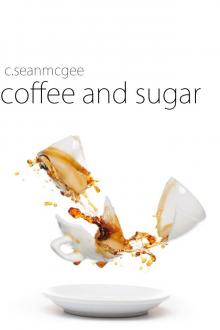 Coffee and Sugar
Coffee and Sugar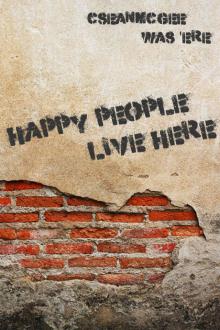 Happy People Live Here
Happy People Live Here_preview.jpg) Alex and The Gruff (A Tale of Horror)
Alex and The Gruff (A Tale of Horror)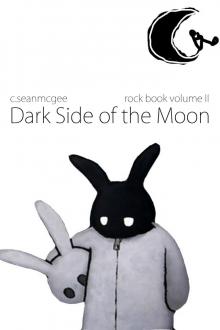 Dark Side of the Moon
Dark Side of the Moon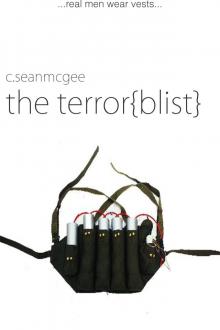 The Terror{blist}
The Terror{blist}_preview.jpg) The Anarchist (...Or About How Everything I Own Is Covered In A Fine Red Dust)
The Anarchist (...Or About How Everything I Own Is Covered In A Fine Red Dust)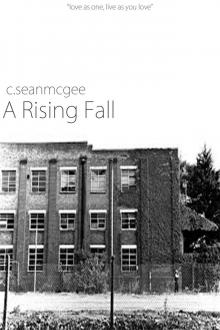 A Rising Fall
A Rising Fall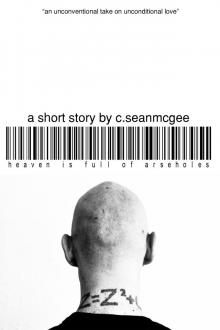 Heaven is Full of Arseholes
Heaven is Full of Arseholes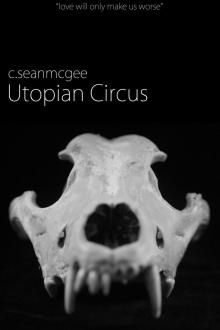 Utopian Circus
Utopian Circus![[2014] The Time Traveler's Wife Read online](http://i1.bookreadfree.com/i/03/24/2014_the_time_travelers_wife_preview.jpg) [2014] The Time Traveler's Wife
[2014] The Time Traveler's Wife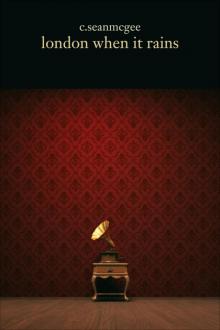 London When it Rains
London When it Rains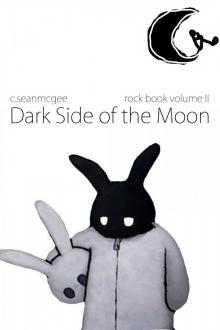 Dark Side of the Moon by C. Sean McGee
Dark Side of the Moon by C. Sean McGee![The Terror[blist] Read online](http://i1.bookreadfree.com/i2/04/06/the_terrorblist_preview.jpg) The Terror[blist]
The Terror[blist]